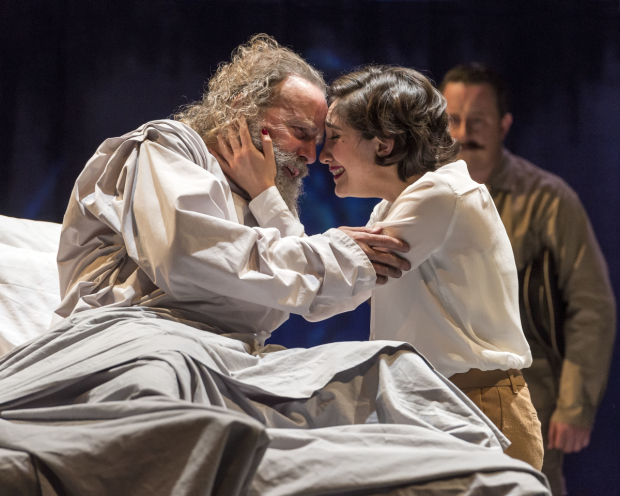King Lear Meets Man of La Mancha in a Season of Dreaming at A Noise Within
In 1991, A Noise Within took its name from the famous stage direction in Act IV Scene V of Hamlet — the first play produced by the fledgling theater company in Pasadena, California. Twenty-five years later, founders, spouses, and co-artistic directors Geoff and Julia Rodriguez-Elliott are celebrating the achievement of their "impossible dream" with repertory productions of the Shakespearean drama King Lear and the Don Quixote-inspired musical Man of La Mancha.
Just days after opening Lear, Julia spoke with us about directing both mountainous productions (each with Geoff in the lead role). The pairing offers a two-sided picture of mental deceit, telling stories of men whose imaginations lead them on their respective journeys of triumph and defeat. While Lear shows a monarch's tragic descent into madness, La Mancha illustrates the positive power of imagination — the imprisoned author Cervantes acting out the story of deluded knight-errant Don Quixote while awaiting his hearing with the Spanish Inquisition.
King Lear takes the stage first, running now through May 6, followed by Man of La Mancha, which opens March 26. However, on April 22 and May 6, the epic masterpieces will be performed on the same day, providing A Noise Within with an opportunity to celebrate its quarter century of classic theater on the West Coast, and allow its audiences to engage with two works that explore the "disruption of a nation" and "hope under impossible circumstances."

(© Daniel Reichert)
This interview has been condensed and edited for clarity.
How did you come to the decision to pair King Lear with Man of La Mancha?
In a sense, both central characters are living this impossible dream. That launched it, and the further we got into working on the plays, we began drawing more and more connections between the two. The first time we did this, we put together Julius Caesar and Threepenny Opera around the theme of revolution, and we found that to be very creatively fulfilling. Going into that process we had some ideas and some thematic connections, but what we found most satisfying was how those connections reveal themselves through the creative process.
Why was the concept of "impossible dreams" appealing to you?
It was a significant year for us because it was a real milestone in terms of it being our twenty-fifth anniversary. We somewhat organically started gravitating towards plays that are about these big dreams, as this whole journey of A Noise Within has been. I don't think we could have imagined that we would find ourselves where we are right now and how relevant a play like Lear is given the current climate. I just read a fascinating article all about how the current presidential administration is Lear without a Fool to be the truth teller. So it’s fascinating to be doing both these plays right now because one speaks to hope under impossible circumstances and one speaks to the dangers of living in that kind of isolation that Lear lives in.
How do you make King Lear and Man of La Mancha live within the same space?
With La Mancha, you have this very claustrophobic confined environment where there's no sense of liberty or the freedom of choice and through their imagination the environment explodes. It's really a story about the imagination. And with Lear, you have this very personal domestic story about a family that's losing their father and how they're dealing with that, [as well as] the universal issues that surround the play and the disruption of a nation. Lear is also very spare and stark and has that nod to the imagination as well. And I think both plays have to have the ability to take us on that epic journey but also on that very intimate journey.
The concept of "impossible dreams" sounds very optimistic. That certainly suits Man of La Mancha but have you found traces of a similar optimism in King Lear?
I won't go so far as to say that the play is optimistic but I think there is hope in the play. There's hope when Lear is stripped of everything that he has. I think that is a journey of discovery for him. The scene at the end that happens with his daughter in prison is a moment of love and self-realization. With Don Quixote, it's about making the impossible possible. For Lear he begins to live in a dream almost right out of the gate, and in his case it's more of a nightmare, but that nightmare ultimately leads him to a discovery of self.
On April 22 and May 6, you'll be presenting both shows on the same day. What do you and your audiences get out of these marathon days?
We did something very similar with Julius Caesar and Threepenny Opera. There were connections that we assumed the audience would make, and they most certainly made some of those, but then people also made their own. That's why that two-show day where we do a little dinner in between is very satisfying. I think theater at its best is always a conversation with the audience. Hopefully what you're doing with these stories is making them about the here and now, about our 21st-century concerns. Some theaters do it with new plays and for us it's about these classic stories and making them accessible to a modern audience.

(© Craig Schwartz)












